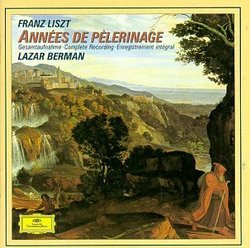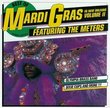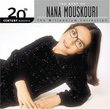| All Artists: Franz Liszt, Lazar Berman Title: Franz Liszt: Années De Pèlerinage Members Wishing: 1 Total Copies: 0 Label: Deutsche Grammophon Release Date: 3/16/1993 Genre: Classical Styles: Forms & Genres, Suites, Historical Periods, Modern, 20th, & 21st Century Number of Discs: 3 SwapaCD Credits: 3 UPCs: 028943720625, 028943720625 |
Search - Franz Liszt, Lazar Berman :: Franz Liszt: Années De Pèlerinage
CD DetailsSimilarly Requested CDs
|
CD ReviewsLiszt Played By A Russian Piano Master. Paul Rossi | Walla Walla, WA | 11/27/2004 (5 out of 5 stars) "Unfortunately, many reviewers on Amazon did not rate these recordings of Lazar Berman playing Franz Liszt's "Annees De Pelerinage" very favorably. I must respectfully disagree. I found Berman's Liszt interpretations commanding and magical. It has been a while since I listened to the "Swiss Book" (Book 1) of the "Years of Pilgrimage," so I will add an addendum after I go back and listen carefully. However, the "Italian Book" (Book 2) is amazing. Berman plays as if he is completely and totally absorbed in the piano music. His touch is very sensitive and emotion-provoking, yet he can deliver pianistic storms when he chooses. The "Petrarch Sonnets" are beautifully played, and the most sensitive listeners will cry upon hearing such deep, beautiful, reflective music. Berman goes beyond the notes and truly delivers musical sonnets. He plays with great lyricism, poetry, control, and nostalgia. Then, Berman gives a tempestuous reading of the "After a Reading of Dante" (the "Dante" Sonata). He really lets loose and shows his technique, power, and passion. Berman handles the runs and monstrous difficulties well, and he goes beyond just being a mechanical technician. I disagree with people who state that Lazar Berman was merely a "piano technician." The "Dante" Sonata shows him to be that and much more. The Third Book of "Years of Pilgrimage," untitled, offers some of the most reflective and forward-looking piano compositions of Franz Liszt. The opening work, "Angelus," evokes church bells and a sort of meditation on religious faith. It tinkles, sparkles, and draws listeners away from worldly concerns and planes of thought. Berman really sparkles, shines, and communicates with "Angelus." If you enjoy the piano music of Claude Debussy, you can really appreciate the advancement in Liszt's composition. The next two pieces are based on the cypress trees that Liszt was impressed by while he and his mistress, Comtesse Marie D'Agoult, saw and admired while they eloped to Italy. Berman plays them beautifully, and the same nostalgic, detached, distant atmosphere of "Angelus" is present. I seem to remember quite a bit of musical turbulence communicated by Berman in the first of these pieces. Many musicians and listeners are well-acquainted with the "Jeux Deau a La Ville D'Este," the water fountain piece that has been cited as an important precursor to Debussy and Ravel (the latter wrote a beautiful, sparkling piece of the same name--"Jeux Deau"). Berman plays the rapid arpeggios with crystalline clarity and evokes the powerful, upward bursts of water from an Italian fountain. The piece is brilliant, and Berman plays with great technical mastery and evocation. I will add more about this boxed set later. I listened to it completely a year ago, and then I listened to the Second and Third Books again last week. However, I would like to hear the "Swiss Book" again, as well as the supplement to the Second Book, "Venezia e Napoli," so I can write more about those particular works. All in all, this is an outstanding set of recordings, and listeners who are interested should not hesitate! Also, if you are interested in Franz Liszt's "Transcendental Etudes," I recommend the Berman recordings. Type in "Lazar Berman" on amazon, and scroll down to the second or third page of listings. Look for a CD with piano keys on the cover and the title, "The Russian School." It is hard to find, and you will most likely have to buy it used, but I recommend it. It is astounding!" A Pianist So Close to Richter and Gilel BLee | HK | 06/17/2005 (4 out of 5 stars) " Few pianists have recorded all the 3 volumes of Pelerinage, as they are so dark. And in case viewers are not too familiar with Berman's playing, I suggest them to start with his Italian Book first (2nd CD)--it is really beautiful-- before going onto the first CD and eventually the third. Better still, go over it all over again. This way one would have a better understanding of Berman's musical language. Otherwise, some viewers may find his reading unmusical, or even sluggish or boring: somewhat like some of Arrau's Beethoven early sonatas when the tempi are getting so slow... Having said that, I nevertheless prefer Arrau's version (extracts only) more as the message comes through more naturally and more convincingly; Arrau's also sounds more orchestral as in accordance with Lizst's intention. But Berman's version is interesting and even more embittered so that it would sometimes be hard to relate his playing with the description in the inlay. Nevertheless, his Italian Book is magical. Listen to these recordings and you will find plenty of justifications for Gilel to say Berman was the best pianist among them, better than himself and better than Richter!" The hyper steeled fingering ! Hiram Gomez Pardo | Valencia, Venezuela | 07/11/2006 (4 out of 5 stars) "
The generation of Russian pianists who were born after the WW2, seemed to have three clear patterns of visions around the paying of the piano: The imaginative rapture and the ability to create risky lyrical flights a la Sviatoslav Richter (Alexander Sloboyadnik, Vladimir Ashkneazy, Vladimir Felstman and Michael Plentev), the rational gaze based on a Apollonian vision whose main exponent was Emil Gilels ( Lazar Berman, Grigori Sokolov and Schura Cherkasky) and finally the cosmic rapture which plainly finds in Tatiana Nikolayeva her most conspicuous Ambassador. Such approach results very appropriate at the moment to play certain Liszt' s scores, or nonromantic composers such as Medtner, Alkan, Prokoviev or Bartok. That's why those performances of Pilgrimage years work out, because the inner visions may be reformulated and extrapolated. I had the pleasant occasion to watch Lazar Berman in 1993 n Caracas. It was a mesmerizing experience; a prodigious technique although certain passages he looked extremely rational, trying to avoid the limits of the exuberance tonal, owning total control of the thematic material, a risky device that may become a boomerang in determined composers. If you want to hear Liszt without theatrical postures and overindulgence, come for this album." |










